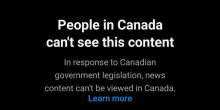Forcing the online giants to pay for news
INTERNET advertising giant Google reached an agreement with the government of Canada, back at the end of November, to pay an annual 100 million Canadian dollars ($73.6 million at the time) to news publishers in the country for the use it makes of what they publish.

A Meta message
Facebook, however, was still holding out as the Freelance went to press. When a user of services of Meta, Inc - such as Facebook or Instagram - posts a link to a news story readers in the country are likely to see a message like: "People in Canada can't see this content: in response to Canadian government legislation, news content can't be viewed in Canada." This seems to apply to all news, wherever published.
The drawback of the Canadian legislation is that - like the Australian move that inspired it - it mandates payments only to publishers. A 2019 European Union law, still gradually coming into belated effect in the member states, stipulates that "authors of works incorporated in a press publication receive an appropriate share of the revenues". This is not perfect - European journalists' unions pressed for a specified share and mode of distribution - but is better than nothing.
Facebook's decision to block news rather than pay for it is reported by the Reuters Institute at Oxford University to have had an immediate effect on traffic to websites. Gretel Kahn writes for the Reuters Institute that "for independent local news business, which the Bill aimed to protect, this new media ecosystem can be a death sentence." In the strange world of internet lobbying, this is an echo of an argument that Google used in resisting paying to use the copyright works that build its profits.
 Google threatens newspapers again but confirms Canada deal
Google threatens newspapers again but confirms Canada deal
![[Freelance]](../gif/fl3H.png)